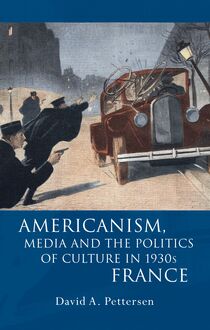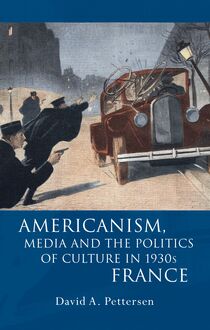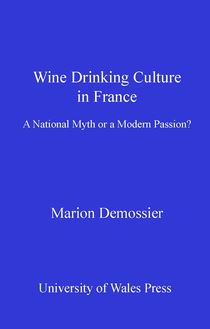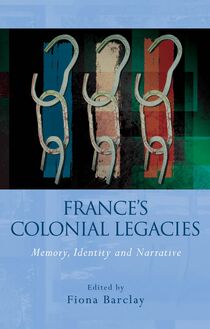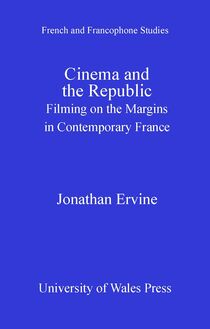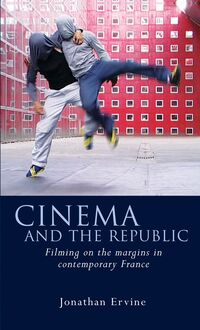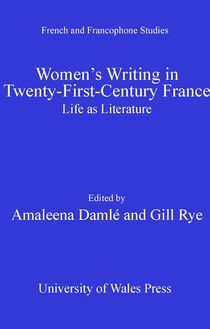-
 Univers
Univers
-
 Ebooks
Ebooks
-
 Livres audio
Livres audio
-
 Presse
Presse
-
 Podcasts
Podcasts
-
 BD
BD
-
 Documents
Documents
-
- Cours
- Révisions
- Ressources pédagogiques
- Sciences de l’éducation
- Manuels scolaires
- Langues
- Travaux de classe
- Annales de BEP
- Etudes supérieures
- Maternelle et primaire
- Fiches de lecture
- Orientation scolaire
- Méthodologie
- Corrigés de devoir
- Annales d’examens et concours
- Annales du bac
- Annales du brevet
- Rapports de stage
La lecture à portée de main
Vous pourrez modifier la taille du texte de cet ouvrage
Découvre YouScribe en t'inscrivant gratuitement
Je m'inscrisThe Algerian War in French/Algerian Writing , livre ebook
Découvre YouScribe en t'inscrivant gratuitement
Je m'inscrisEn savoir plus
Vous pourrez modifier la taille du texte de cet ouvrage
En savoir plus

Description
This is the first book-length study to analyse and problematize the notion of literary texts as ‘sites of memory’ with regard to the representation of the Algerian War of Independence (1954–62), and memories of it, in the work of French authors of Algerian origin. The book considers a primary corpus spanning over forty literary texts published between 1981 and 2012, analysing the extent to which texts are able to collect diverse and apparently competing memories, and in the process present the heterogeneous nature of memories of the Algerian War. By setting up the notion of literary texts as ‘sites of memory’, where the potentially explosive but also consensual encounter between former colonizer and colonized subject takes place, the book contributes to ongoing debates surrounding the contested place of narratives of empire in French collective memory, and the ambiguous place of immigrants from the former colonies and their children in dominant definitions of French identity.
Series Editors’ Preface
Acknowledgements
Introduction
Chapter 1: History and Fiction: Literary Spaces, Memorial
Spaces
Chapter 2: Marginalization, Violence and (Dis)Integration:
Sites of Republican Memory and Legacies of the
Algerian War
Chapter 3: The Entanglement of Dominant and Other
Histories: Representations of 17 October 1961
Conclusion
Notes
Bibliography
Index
Sujets
Informations
| Publié par | University of Wales Press |
| Date de parution | 05 octobre 2018 |
| Nombre de lectures | 0 |
| EAN13 | 9781786833068 |
| Langue | English |
| Poids de l'ouvrage | 1 Mo |
Informations légales : prix de location à la page 0,1900€. Cette information est donnée uniquement à titre indicatif conformément à la législation en vigueur.
Extrait
FRENCH AND FRANCOPHONE STUDIES
The Algerian War in French/Algerian Writing
Series Editors
Hanna Diamond (Cardiff University)
Claire Gorrara (Cardiff University)
Editorial Board
Kate Averis (University of London Institute in Paris)
Colin Davis (Royal Holloway, University of London)
Didier Francfort (Université Nancy 2)
Sharif Gemie (University of South Wales)
Kate Griffiths (Cardiff University)
Rod Kedward (University of Sussex)
Simon Kemp (University of Oxford)
Ronan Le Coadic (Université Rennes 2)
Margaret Majumdar (University of Portsmouth)
Nicholas Parsons (Cardiff University)
Debarati Sanyal (University of California, Berkeley)
Maxim Silverman (University of Leeds)
Other titles in the series
Helena Chadderton and Angela Kimyongür (eds), Engagement in Twenty-first-Century French and Francophone Culture: Countering Crises (2017)
Kate Averis and Isabel Hollis-Touré (eds), Exiles, Travellers and Vagabonds: Rethinking Mobility in Francophone Women s Writing (2016)
David A. Pettersen, Americanism, Media and the Politics of Culture in 1930s France (2016)
Amaleena Damlé and Gill Rye (eds), Women s Writing in Twenty-First-Century France: Life as Literature (2013)
Fiona Barclay (ed.), France s Colonial Legacies: Memory, Identity and Narrative (2013)
Jonathan Ervine, Cinema and the Republic: Filming on the margins in contemporary France (2013)
Kate Griffiths and Andrew Watts, Adapting Nineteenth-Century France: Literature in Film, Theatre, Television, Radio and Print (2013)
Ceri Morgan, Mindscapes of Montréal: Québec s urban novel, 1950-2005 (2012)
FRENCH AND FRANCOPHONE STUDIES
The Algerian War in French/Algerian Writing
Literary Sites of Memory
JONATHAN LEWIS -->
UNIVERSITY OF WALES PRESS 2018
© Jonathan Lewis, 2018
All rights reserved. No part of this book may be reproduced in any material form (including photocopying or storing it in any medium by electronic means and whether or not transiently or incidentally to some other use of this publication) without the written permission of the copyright owner except in accordance with the provisions of the Copyright, Designs and Patents Act 1988. Applications for the copyright owner s written permission to reproduce any part of this publication should be addressed to The University of Wales Press, University Registry, King Edward VII Avenue, Cardiff CF10 3NS.
www.uwp.co.uk
British Library Cataloguing-in-Publication Data
A catalogue record for this book is available from the British Library.
ISBN 978-1-78683-304-4
eISBN 978-1-78683-306-8
The right of Jonathan Lewis to be identified as author of this work has been asserted in accordance with sections 77, 78 and 79 of the Copyright, Designs and Patents Act 1988.
The publisher has no responsibility for the persistence or accuracy of URLs for any external or third-party internet websites referred to in this book, and does not guarantee that any content on such websites is, or will remain, accurate or appropriate.
Cover design by Clifford Hayes (Alamy and Shutterstock images by permission).
Contents
Series Editors Preface
Acknowledgements
Introduction
Chapter 1: History and Fiction: Literary Spaces, Memorial Spaces
Chapter 2: Marginalization, Violence and (Dis)Integration: Sites of Republican Memory and Legacies of the Algerian War
Chapter 3: The Entanglement of Dominant and Other Histories: Representations of 17 October 1961
Conclusion
Notes
Bibliography
Series Editors Preface
This series showcases the work of new and established scholars working within the fields of French and francophone studies. It publishes introductory texts aimed at a student readership, as well as research-orientated monographs at the cutting edge of their discipline area. The series aims to highlight shifting patterns of research in French and francophone studies, to re-evaluate traditional representations of French and francophone identities and to encourage the exchange of ideas and perspectives across a wide range of discipline areas. The emphasis throughout the series will be on the ways in which French and francophone communities across the world are evolving into the twenty-first century.
Hanna Diamond and Claire Gorrara
Στή γιαγιά μου
Acknowledgements
My thanks, first and foremost, to Kate Marsh, for her invaluable advice and support throughout the writing of this book. I would also like to thank Charles Forsdick for his guidance and for commenting on chapters along the way. Friends and colleagues in the Department of Modern Languages and Cultures at the University of Liverpool, past and present, have provided much-valued encouragement and advice that have, in more important ways than perhaps they have thought, helped me to complete this book. In particular, I would like to thank Kay Chadwick, Chris Harris, S¸ izen Yiacoup, Godfried Croenen, Hugh Hiscock and Kate Hodgson. I am especially grateful to Sarah Lewis at University of Wales Press for responding to queries and for her guidance and help throughout the preparation of the manuscript.
This book developed from doctoral research undertaken at the University of Exeter, and I would like to thank Helen Vassallo for her supervision, Chloe Paver, Paul Cooke, David Houston Jones and Richard Mansell for their input and advice, and other friends and colleagues who, in different ways, helped in getting this project off the ground. In particular, thanks to Damien Gaucher, Lucie Riou, Helen Simmonds, Rebecca Knight, Marjorie White and Laurie Dekhissi for their friendship and support. I am also grateful to the Department of Modern Languages at the University of Exeter for awarding me a doctoral bursary to help fund the research for this project. I reserve a special thank you to Martin Sorrell for inspiring me to pursue an academic career.
A one-year lectureship at the University of Portsmouth allowed me to exchange ideas that equally helped in shaping this project. In particular, I would like to thank Natalya Vince, Walid Benkhaled, Emmanuel Godin, Ann Matear, Manus McGrogan, Martin Evans, Tony Chafer and Joanna Warson. A special thank you to Ben Garner for his friendship and wisdom.
Over the last few years, I have been lucky to have had the opportunity to discuss my work with a number of fellow academics whose insights and advice I have greatly appreciated. I am especially grateful to Fiona Barclay for providing guidance during the early stages of writing this book, to Ruth Scales for her friendship and support, to Philip Dine for his comments on early versions of my work, and also to Patrick Crowley and Jim House. Events organized by the Association for the Study of Modern and Contemporary France, the Society for Francophone Postcolonial Studies and the Society for French Studies have provided a supportive environment for the exchange of ideas and for meeting others working in the same field, senior academics and postgraduate students alike. I am also indebted to the reviewers of an article submitted to Modern & Contemporary France for their comments and suggestions, which helped to shape Chapter 3 of this book. Part of Chapter 3 is a reproduction of an article that was originally published in Modern & Contemporary France entitled Filling in the Blanks: Memories of 17 October 1961 in Leïla Sebbar s La Seine était rouge , which appeared in volume 20/03 (2012). This has been reproduced with kind permission from Taylor & Francis.
Finally, I am grateful to my wife Vicki for her patience and good humour throughout the writing of this book, to my parents and brother for their support, both financial and emotional, and to my daughter Ada (11 months old as I write this) for encouraging me to write outside my normal working hours.
Introduction
Memories of the Algerian War are everywhere in France. For so long characterized as une guerre sans nom ( a war without a name ), 1 due in large part to the official state amnesia to which it was subjected for over three decades since its end in 1962, the war has been firmly established in mainstream French political and public debate since the beginning of the twenty-first century. In an article in Le Monde marking the fiftieth anniversary of the end of the conflict, the leading francophone historian of the Algerian War Benjamin Stora points to the very public debate at the beginning of the 2000s over the use of torture by the French army during the war, the scheduling of the Year of Algeria in 2003 and the publication in 2004 of La Guerre d Algérie, 1954-2004: La Fin de l amnésie , edited by himself and Mohammed Harbi, as evidence of the prevalence of the war in the French consciousness since the turn of the century. 2 As Stora goes on to outline however, the conciliatory potential of a more open and public recognition of this traumatic event in French history does not necessarily lead to consensus when it comes to interpreting and remembering the past. The torture debate itself, launched after the publication in Le Monde of Louisette Ighilahriz s account of being subjected to torture at the hands of the French army and subsequent denials and confessions on the part of high-ranking French generals, demonstrated what Stora has called la guerre des mémoires ( memory wars ), 3 as several opposing accounts were allowed to circulate and, in effect, replay divisions and conflicts inherited from the war. Similarly, the passing of a law in 2005, which included an article stipulating that schools were required to teach the positive role of the French presence overseas, especially in North Africa, was met with fierce criticism by historians and other public figures, further demonstrating the disparity between different accounts of the past that were released in the explosion of memory 4 since the turn of the century. Despite the repealing of the article in question, Stora notes that, in the wake of the controversy, it proved impossible to settle on a date to mark the official end of
-
 Univers
Univers
-
 Ebooks
Ebooks
-
 Livres audio
Livres audio
-
 Presse
Presse
-
 Podcasts
Podcasts
-
 BD
BD
-
 Documents
Documents
-
Jeunesse
-
Littérature
-
Ressources professionnelles
-
Santé et bien-être
-
Savoirs
-
Education
-
Loisirs et hobbies
-
Art, musique et cinéma
-
Actualité et débat de société
-
Jeunesse
-
Littérature
-
Ressources professionnelles
-
Santé et bien-être
-
Savoirs
-
Education
-
Loisirs et hobbies
-
Art, musique et cinéma
-
Actualité et débat de société
-
Actualités
-
Lifestyle
-
Presse jeunesse
-
Presse professionnelle
-
Pratique
-
Presse sportive
-
Presse internationale
-
Culture & Médias
-
Action et Aventures
-
Science-fiction et Fantasy
-
Société
-
Jeunesse
-
Littérature
-
Ressources professionnelles
-
Santé et bien-être
-
Savoirs
-
Education
-
Loisirs et hobbies
-
Art, musique et cinéma
-
Actualité et débat de société
- Cours
- Révisions
- Ressources pédagogiques
- Sciences de l’éducation
- Manuels scolaires
- Langues
- Travaux de classe
- Annales de BEP
- Etudes supérieures
- Maternelle et primaire
- Fiches de lecture
- Orientation scolaire
- Méthodologie
- Corrigés de devoir
- Annales d’examens et concours
- Annales du bac
- Annales du brevet
- Rapports de stage

